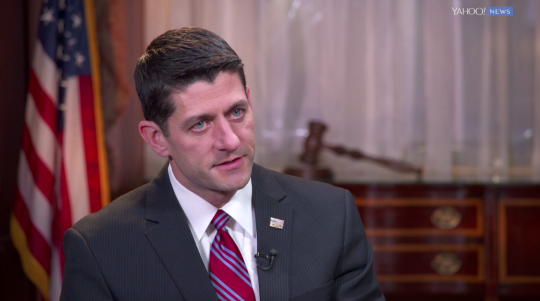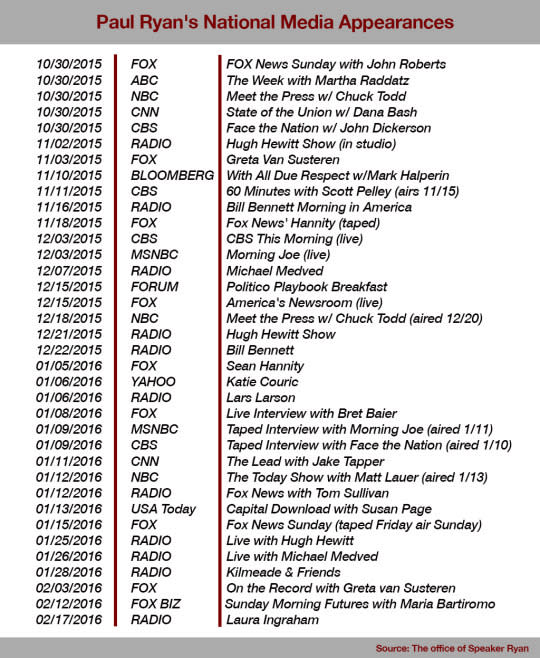Paul Ryan: Speaker of the airwaves

Paul D. Ryan, R-Wis., sat down with Yahoo News’ Katie Couric in one of his many national interviews since becoming speaker. (Photo: Yahoo News)
Paul D. Ryan is revolutionizing the job of speaker of the House, adding to his constitutional responsibilities as the nation’s top legislator the role of ubiquitous spokesperson and advocate for his party’s agenda.
At a time when Republicans seem to be divided against themselves — with House conservatives still savoring their victory in forcing out Ryan’s predecessor, John Boehner, and Donald J. Trump as the GOP frontrunner for president — Ryan’s emergence as a fixture on national TV and radio is both pervasive and highly significant.
Through the first four months of his tenure as Washington’s highest-ranking Republican, Ryan has emerged as the speaker of the airwaves, racking up 37 national radio and television appearances, according to a count provided by his office, including a Fox News hit Monday with Megyn Kelly and a scheduled appearance Tuesday morning on CNBC.
For context, Boehner never did more than 38 interviews in a year as speaker, and Ryan has participated in nearly as many interviews as the House has had days in session, 38, since he was elected to lead Republicans.
“He takes seriously his duty to communicate conservative policies and use the bully pulpit he has,” spokeswoman Ashlee Strong said.
Ryan was uniquely qualified to undertake a hyperactive media schedule. His time as a vice presidential candidate in 2012, his message discipline and general comfort with reporters all make him a natural fit for a modern media speaker. And his credibility with the political base makes him a better fit for the role than Boehner, whose members encouraged him to do more television appearances to provide them political cover in their districts, while shoring up their own right-wing credentials by railing against “the establishment” in various media forums, especially conservative talk radio.
Boehner’s presence on national television and radio steadily declined as his speakership progressed. In 2011, he made 38 national TV and radio appearances and by 2014, he was down to eight, in part because of how controversial immigration reform had become — and the growing belief that almost anything he said would agitate a faction within his own party. Between January and October of 2015, he did 20 national TV and media appearances, but that figure includes the exit interviews he did after his resignation.
Still, Boehner laid the foundation for Ryan’s PR approach, becoming the first-ever House leader to do on-camera weekly briefings with reporters in 2006. As the No. 2 Republican under Speaker Dennis Hastert, Boehner also took on a large media schedule to communicate the House Republican message because the speaker rarely made TV or radio appearances.
Ryan, however, has certainly upped his game, having already hit all the Sunday morning public affairs programs — many twice — and also making regular appearances on conservative programs that challenge establishment Republicans, from Laura Ingraham’s radio show to Sean Hannity’s TV show on Fox News. Ryan has also agreed to do local and regional interviews at the request of members who want his voice heard in their districts, ranging from Colorado to Missouri.

But Ryan may be creating a precedent that cannot be met by future leaders who may not possess his media skills. Though members have clamored for a more media-friendly leader — and Ryan is delivering for them — there are few Republicans in the party’s pipeline who can be as versatile on television as Ryan while also possessing the other skills necessary to be speaker.
To understand how complicated it can be to try to please members and TV audiences, it’s instructive to consider last October when pressure was put on House Majority Leader Kevin McCarthy of California to convince conservatives to support him for speaker. McCarthy, whose candidacy met with resistance from House conservatives, blundered when he appeared on Hannity’s show and praised the committee investigating the Benghazi attacks for damaging the reputation of former Secretary of State Hillary Clinton. The comments embarrassed Republicans who had been insisting for months that the committee was above politics.
It remains to be seen whether Ryan will keep up such a grueling media schedule when he actually has to pass controversial legislation, such as spending bills to keep the government open. (The current version was written and passed in one of Boehner’s last acts.) Neither the House nor the Senate is expected to agree on any major policy proposal or law before the November election. Instead, Republicans and Democrats will use the little time they are in Washington to try to pass “messaging” bills or set a larger agenda for their parties. Ryan is already tackling that latter task, implicitly acknowledging the policy vacuum left by the GOP’s leading presidential candidates.
For now, Ryan seems to have learned a lesson from the end of the Boehner speakership, which is that if he does not speak for himself, others will fill the airtime with messages that might not reflect the leadership’s goals and priorities.
The question is whether it is possible to continuously rule two of Washington’s most unwieldy chambers: the House chamber and the media echo one. Ryan thinks he can, and if he does, he’ll change the expectations for anyone who might seek to succeed him.
